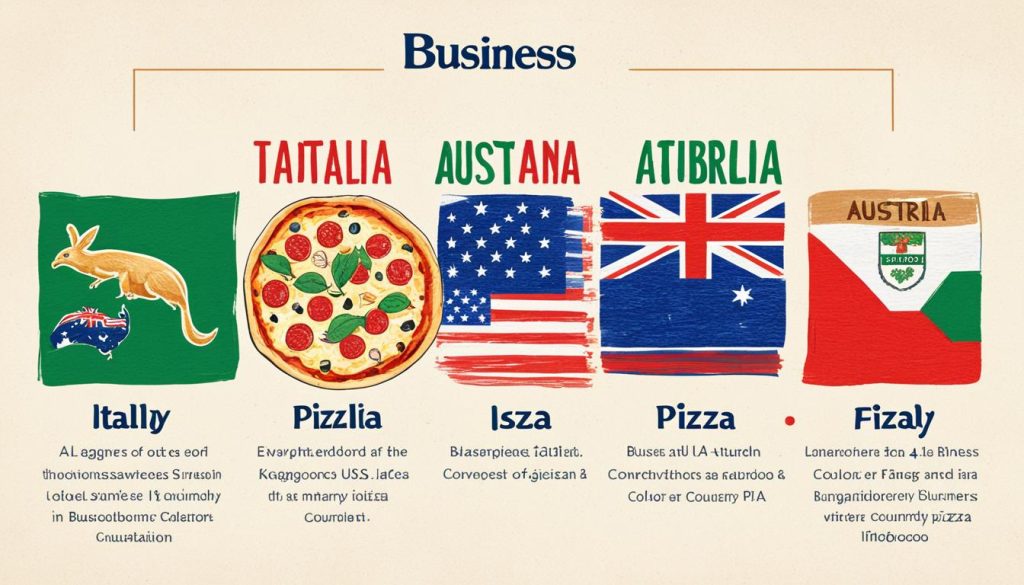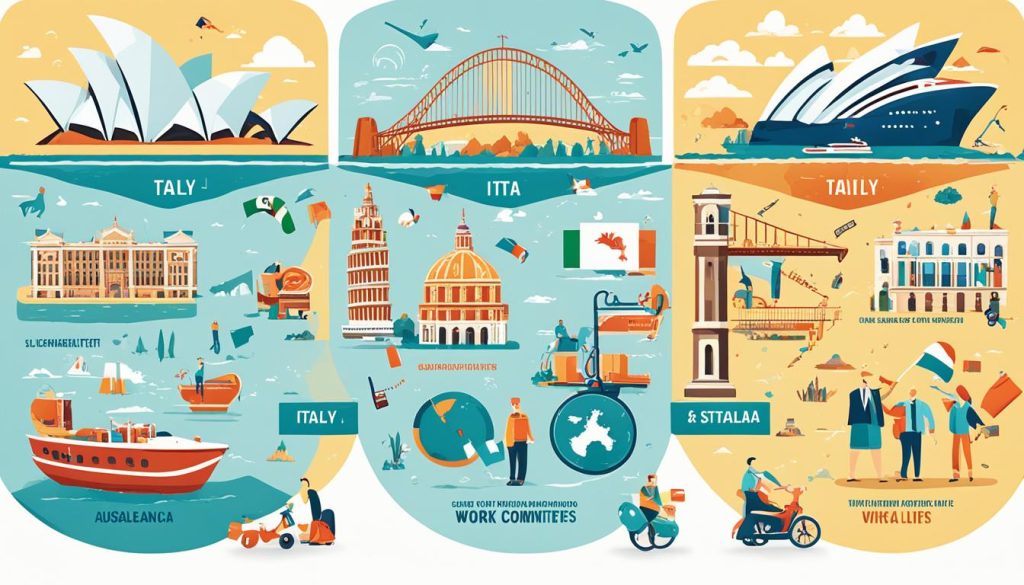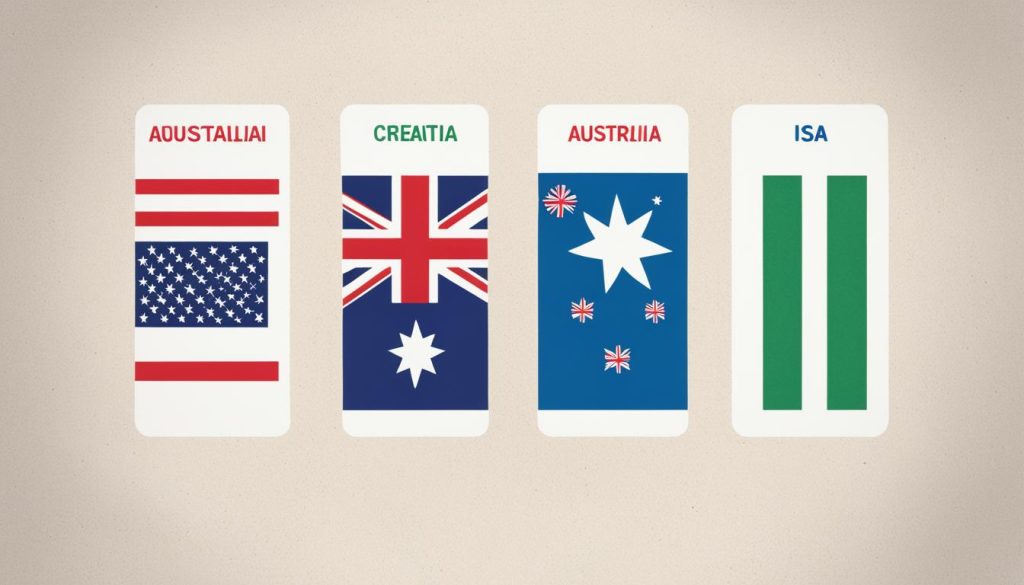Understanding how business and culture come together is key for managing international operations. The differences in business practices across Australia, America, and Italy offer an interesting view into global commerce. Culture greatly affects these practices, changing how businesses communicate and negotiate.
Australia’s relaxed but competitive vibe contrasts with the USA’s energetic and ambitious work setting. In Italy, business focuses more on traditional values and building relationships. Knowing the distinct cultures of these countries helps with working together successfully.
Understanding Business Culture Complexity
The Business Culture Complexity Index™ shines a light on many factors that affect global trade and business across countries. This tool mixes social data with economic indicators, showing how easy or hard it is to do business in various places. The complexity of business culture influences international trade and local economic freedom.
An Overview of the Business Culture Complexity Index™
This index uses information from many sources, adding cultural details to economic facts. It brings together data from 14 different places to offer insights into international business subtleties.
- Denmark is known for its simple and clear business environment, sitting at the low end of the index.
- On the flip side, Bangladesh faces challenges due to complexity, affecting trust and economic freedom.
Ease of Doing Business: How Australia, USA, and Italy Fare
Looking at ease of doing business, there’s a big difference between countries. The USA stands out for its economic freedom and clear rules, helping businesses grow.
- Australia has a different approach, with equal chances for all and a simple business model.
- Italy, with its family connections and old traditions, has more business challenges and a lower ease score.
This talk about business culture shows how different each country’s approach to business and economy is. It highlights the social and economic setups that shape how business is done.
Historical Perspectives on Doing Business
Looking at the history of traditional commerce practices, we find a rich mix of paths. These have helped shape today’s global business scene. The US is known for its focus on freedom and business. This mindset has created a marketplace keen on competition and innovation, impacting economic development worldwide.
In Italy, things look a bit different with its long history of family businesses and specific regional skills. These ventures are crucial to Italy’s economy, relying on detailed craftsmanship and local customers. This shows how historical business evolution affects today’s trade.
Australia’s trade has roots in both indigenous deals and colonial trade practices. After colonisation, it has balanced these influences with a regard for fairness. This mix respects both tradition and international trade standards.
- United States: Innovation and personal business drive helps its economy grow.
- Italy: Strong family bonds and local knowledge play big roles in its commerce, protecting valuable traditions.
- Australia: Its market reflects both ancient and current influences, aiming for fairness and global standards.
Different traditional commerce practices highlight how countries use their history and culture to develop their economies. This link between cultural heritage and economic growth is crucial.
Modern Business Practices in Australia, USA and Italy
Global markets are now more connected than ever. This shows us how modern business practices mix culture, innovation, and tradition. In the Australasian region, they embrace innovation in business and use cooperative business structures to move forward. On the other hand, the American entrepreneurship spirit takes a bold path towards market strategies that stand out worldwide. Meanwhile, Italian family businesses keep to commercial traditions that blend personal and professional life. This creates a unique heritage and business etiquette in Italy.
Australasian Approach to Innovation and Management
The approach in the Australasian area focuses on teamwork and equality. They avoid strict hierarchies and favour cooperative business structures. This method encourages diverse ideas and lets everyone at all levels help shape the innovation in business culture.
American Entrepreneurship and Market Domination
American entrepreneurship is known for its bold and decisive actions. The aim is to create corporate leadership that leads to peak performance. America has become a model for market strategies that not just find opportunities but also create them. This influences trends and the wants of consumers across the globe.
Italian Business Etiquette and Family Enterprises
Italian family businesses show the power of sticking to tradition. They focus on personal connections. Business etiquette in Italy looks at the big picture, aiming to build a lasting trust. This keeps the country’s respected commercial traditions alive.
The Role of Trust and Transparency in Business
In the corporate world, trust and clear governance are key. These factors help build strong business relationships. They are especially important in countries like Australia, the US, and Italy.
Building Business Relationships in Australia
In Australia, being open and genuine is vital for business. There is a strong sense of respect and trust. This leads to successful business networking. Businesses are expected to act with integrity and clarity.
The Significance of Trust in the US Corporate World
In the US, trust is everything in business. Companies must communicate clearly and honestly. This encourages a culture where open governance is standard. It helps companies deal with complex situations easily.
Importance of Personal Connections in Italian Commerce
Italy, however, focuses on personal relationships in business. Strong, long-term connections are highly valued. This approach is crucial for business success in Italy. It depends heavily on a well-connected personal network.
Societal Values and Their Business Implications
The link between society and business creates a unique mix of cultural values in business. In Australia, teamwork and looking out for each other are key. These values lead to fair and inclusive business practices. Such practices are about doing right by everyone, not just following rules.
In the United States, the focus is on the individual and striving to be the best. This creates a culture that values hard work and smart solutions. Ethical business here means competing hard but fairly, with a strong sense of right and wrong.
Italy values close personal ties and community respect in business. These values shape dealings, emphasizing trust and mutual respect. Here, being ethical in business means keeping those community and family bonds strong.
-
Cultural values in business in Australia support equality and honesty.
-
The societal influences in the USA push for hard work and innovation.
-
In Italy, ethical business conduct links closely to familial loyalty and dignity.
Societal effects on business are complex, involving history, culture, and ethics. These elements change with society but always shape business deeply. Knowing these societal values helps in understanding global business actions and goals.
Communicating Across Cultures: Australia, USA and Italy
Global business communication goes beyond just speaking a language well. Understanding cultural communication differences matters a lot when you’re dealing with partners from Australia, the USA, and Italy. These countries show different business interaction styles, which impact how they share and understand messages in business.
High Context vs Low Context Communication Styles
International communications are shaped by high-context and low-context communication styles. Most businesses in Australia and the USA use a low-context style. Here, messages are given clearly and in a straightforward manner. This helps everyone understand what is expected, helping avoid confusion and making transactions smoother.
Italy, however, often uses a high-context style in business interactions. This method relies on the unspoken parts of a conversation and non-verbal hints. Understanding the deep cultural business strategies is key to get the full message. Knowing the differences between these styles is critical for successful cultural negotiation.
Cross-Cultural Negotiations and Deal-Making
Understanding cultural negotiation and deal-making approaches can help you handle international negotiations better. Australians’ straightforward business interaction styles make reaching agreements easier. Meanwhile, Italians focus on building relationships and using non-verbal cues in their deal-making approaches. This can take more time and attention to subtle details.
Americans tend to be assertive and want to get things done efficiently. Their deal-making approaches are clear about what they want and are ready for direct international negotiations. Combining different cultural communication differences requires skill. It’s about showing respect, understanding other cultures, and adjusting communication styles to fit every situation.
- Direct communication often characterises Australian business interaction styles.
- American deal-making approaches are underscored by assertiveness.
- Italian cultural business strategies typically value relationships over transactions.
By seeing and adjusting to different communication cues and traditions, professionals can set the stage for better and more successful international negotiations and partnerships.
Comparing Work-Life Balance across the Countries
When we look at work-life integration, it affects how people feel about their jobs. In Australia, the USA, and Italy, the approach is quite different. Each country practices business norms that reflect their values. In the USA, there’s a big focus on working hard and being efficient. Yet, Italy cherishes family time and relaxation, making their cultural lifestyle balance quite unique.
Global changes are mixing personal and work lives more than ever. This mix challenges old work practices tied to each country’s values.
- In the USA, the drive for high efficiency means flexible work policies. But, this can lead to a non-stop work mentality.
- Australia finds a middle ground with many initiatives. They highlight the need for free time and looking after your mind.
- Italy stays true to its tradition, putting family and socializing first. This influences businesses to allow for long lunches and August breaks.
Looking into work-life integration and cultural lifestyle balance shows us something. Global business strategies need to be flexible. They should respect business norms in each place to make employees happy and businesses successful.
Analysing Performance and Productivity in Different Cultures
In our global economy, it’s important to understand how culture impacts work. This knowledge helps businesses succeed internationally. Different cultures have their own ways of boosting productivity and orientation. Some focus on rewards for personal achievements. Others value strong relationships among staff.
Performance-Oriented Cultures vs Relationship-Oriented Cultures
In the United States, workplaces focus on results and achievements. This approach encourages competition. It helps employees by providing clear career paths and rewards for innovation.
In Italy, the focus is on loyalty and teamwork. Their tradition of family-run businesses shows how they value long-term bonds. This creates a unique work culture.
Workplace Motivations and Rewards in Diverse Business Environments
Different countries use various strategies to motivate their workers. In the United States, good salaries and advancement motivate employees. Australia combines personal achievements with team goals. This balance improves work-life harmony.
Italy sees the value in social connections and job security. They balance material rewards with the importance of being happy at work. This approach shows the various ways culture shapes workplace motivation.
Compare Business and Culture between Australia, USA and Italy
When we look at comparative business analysis among Australia, the USA, and Italy, we see different influences. These influences come from history, society, and communication on business. The effect of cultural impact on commerce in these countries is significant. It mirrors their diverse approaches to economic freedom, trust, and social values. Understanding these differences is key for businesses. It helps them grasp global market subtleties and succeed in a world leaning towards global trade.
We will dive into how businesses behave and cultural attitudes in these three important countries. They are key figures in the world market.
- Economic Freedom: The analysis puts the USA’s free market, Australia’s fair trade conditions, and Italy’s unique market challenges in focus.
- Levels of Trust: Trust is crucial in business. Australia is known for its open dealings, the USA values corporate honesty, and Italy trusts in family networks.
- Collectivism vs Individualism: The interplay between teamwork and personal goals drives business. Australia supports teamwork, the USA showcases personal success, and Italy values family in business.
Understanding these global trade insights is vital for aligning business strategies with cultural specifics. Businesses eyeing these markets can gain a lot by knowing these differences. This knowledge helps them navigate the complex business landscapes defined by rich cultural traditions.
Innovation and Technological Adoption in Global Business
In today’s fast-paced world, global business stands at the forefront of technological advancements. We explore how various cultures adapt, enhancing their innovation ecosystems for global needs. The USA, Australia, and Italy each take unique approaches to navigate digital transformation.
The USA is a leader, driving global market changes with its tech advancements. In Silicon Valley, a hub for innovation, ideas constantly break new ground. This push for progress keeps the USA leading in digital change.
- American tech giants lead in AI, cloud, and quantum computing.
- Startups are supported in competitive, well-funded innovation ecosystems.
- Innovation is key for success and dominating the market here.
Australia takes a team approach to tech changes. It values inclusion in its innovation system, making sure tech serves the community. This ethos promotes tech advancements that benefit everyone.
- Eco-friendly tech is a big focus in Australia.
- Government schemes encourage shared innovation ecosystems.
- Australia uses public-private partnerships to embrace tech thoughtfully.
Italy mixes the old with the new, merging technology with tradition. Automation and smart manufacturing are reshaping Italian business, without losing its heritage. This balance maintains a valued innovation ecosystem, blending culture with modernity.
- Italian fashion and cars mix classic design with new tech.
- Tech startups thrive among traditional firms, fostering unique connections.
- Design thinking is central to Italy’s tech journey.
Different countries adopt tech in their own ways as global business grows. The USA pushes for rapid tech progress, while Australia focuses on communal gains. Italy, meanwhile, blends new tech with its historic legacy.
Understanding Gender Egalitarianism in the Workplace
The push for gender equity in the workplace is a major discussion point globally. Factors like women in leadership and inclusive practices are changing organisations. This shift is improving workplace culture around the world.
Women in Leadership: Australia, USA and Italy Compared
In female leadership, Australia and the USA are leading the way. They work hard to get more women into leadership roles. This work helps with business inclusion. Italy’s progress is slower due to its traditional views and customs.
Challenges and Opportunities for Gender Equality in Business
Gender equality faces many challenges that differ by country due to culture. These challenges offer chances to bring diverse views into top-level meetings. Solutions focused on inclusion increase fairness and improve the industry’s problem-solving and creativity.
- Advocacy for gender equity in corporate roles remains crucial to breaking the glass ceiling.
- Leadership programmes targeted at female professionals can help bridge the existing gap in executive roles.
- Policy development in favour of gender equality promotes diversity while tackling inherent biases in business sectors.
- Corporate culture plays a critical role in either facilitating or hindering progress towards business inclusion.
To conclude, making a workplace where women can lead demands effort from all sectors. It offers both challenges and chances to make business fairer for everyone.
Assessing the Impact of Legal and Economic Frameworks
The link between legal systems and economic decisions plays a big role in business. These rules not only guide how businesses operate but also affect a country’s economic health and growth. By looking into these aspects, businesses and investors get a clearer view of their chances and the areas they can invest in.
Regulatory Environments and Their Effect on Business Operations
In places like the USA and Australia, clear and fair legal systems support strong businesses. On the other hand, Italy’s complex laws and cultural norms make business a bit more challenging. This means companies must really understand the local rules to thrive and manage risks well.
Economic Stability and Investment Opportunities
Smart economic policies create a good space for businesses and investments to grow. The USA, known for its financial steadiness, offers many opportunities for investors. Similarly, Australia is seen as resilient, promising a bright future for businesses. Italy, despite its ups and downs, holds unique chances for those who understand its market. Investors look at these points to pick markets that offer both security and high returns.
Differences in Corporate Hierarchies and Management Styles
In global business, management styles, hierarchy, and decision-making are key. They shape work cultures around the world. Societal values influence how companies operate and how managers behave. This helps us understand Australian corporate culture and its differences with the USA and Italy.
Autonomy and Decision-Making in Australian Businesses
Australian companies focus on manager freedom and group decision-making. They aim for few management levels and give employees more control. This leads to faster reactions to market changes and supports equality and teamwork.
Australians embrace flexible work structures for better innovation. This approach reduces barriers and boosts idea sharing. It creates a teamwork-driven environment essential for growth and facing new challenges.
Corporate Ladder vs Flexible Structures: USA and Italy
The USA and Italy differ in their corporate hierarchies. In the USA, there’s a clear path up the corporate ladder. This method outlines career growth opportunities and encourages a structured workplace.
Italian businesses use a more flexible setup. Here, family connections can play a big role in career progress. These less formal networks underline the importance of relationships in Italian commerce.
To work well with international teams, understanding these cultural differences is crucial. Effective management considers each country’s unique corporate style. This ensures success across borders.
Conclusion
Our journey through the business landscapes of Australia, the USA, and Italy is ending. We see that global trade varies greatly, shaped by different cultures. Our study gives cross-cultural business insights useful for real-world global operations. This knowledge helps build respectful and successful international ties.
In each country, business customs vary. Australia values fairness, the USA loves bold innovation, and Italy holds family traditions dear. These insights give professionals skills in intercultural management competence. This is key for better negotiations, improving management, and making plans that respect cultural differences.
Dealing with global market complexity means blending these cultural details into your business. Knowing each place’s unique traits leads to lasting and positive international relationships. With this knowledge, companies can step into the global market confidently. They’ll have what they need to thrive worldwide.















